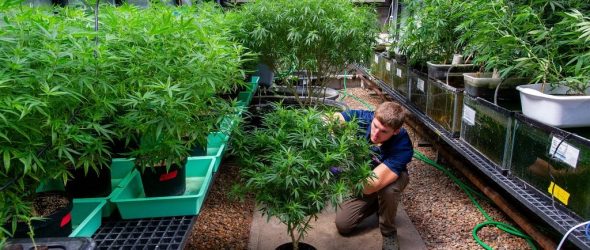
Mike Sweeney, Special to The Colorado Sun
It’s not so much the claims made about the magic qualities of cannabinoids that prick up the ears — curing tuberculosis, anxiety, chronic pain, liver disease. Pretty standard hype in a world of consumers slathering themselves inside and out with anything labeled CBD or THC.
It’s the year.
The advertising hype about miraculous treatment of “general debility” and “nervous excitement” plaguing the populace came in 1857.
Skip to the now, and the Food and Drug Administration is sending warning letters to cannabinoid marketers in Colorado and other states ordering them to cease claiming they can alleviate everything from autism to hepatitis to cancer and Tourette’s syndrome.
It’s been 163 years — have we learned anything scientific about the medical properties of marijuana products?
A little.
Colorado, California and a small handful of other states are trying to lead the way by steering funds derived from marijuana legalization toward controlled, peer-approved studies assessing the medical effectiveness of cannabis compounds. Colorado began in 2014 with a $7 million commitment from medical marijuana registration fees, and the state health director saying it was time to move from the “anecdotal” toward “good science.” ‘
When it comes to marijuana and two of its key components, THC and CBD, “there are a lot of claims, and like anything people are using or consuming there needs to be the research behind it to validate those claims,” said Chad Kinney, director of the state-funded Institute of Cannabis Research and professor of chemistry at Colorado State University Pueblo.
What pre- and post-legalization studies have pinpointed is that THC, the psychoactive compound from marijuana that produces a “high” for users, is medically effective for a few conditions including chronic neuropathic pain, muscle spasticity from multiple sclerosis and nausea and weight loss in cancer patients.
CBD, short for cannabidiol, has no psychoactive effects, and is being studied for a number of “plausible” if as-yet unproven claims, said Dr. Igor Grant, director of the state-funded Center for Medicinal Cannabis Research at the University of California San Diego. The only truly proven area so far for CBD is for severely debilitating epilepsy seizures in young children, research that grew out of a cluster of Colorado cases and treatments.
Other areas for CBD are “promising,” though years and multiple studies away from getting medical sanction, Grant said, including rheumatoid or inflammatory arthritis, anxiety disorders and inflammatory bowel disease.
To read the rest of the Colorado Sun article, click here.


